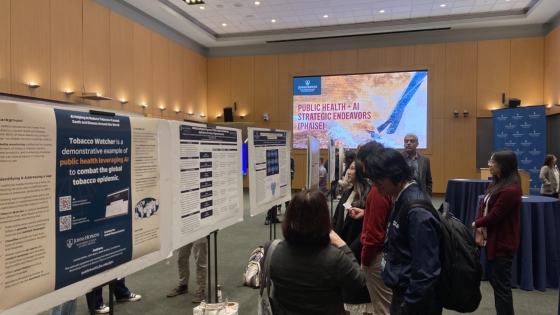PHAISE

PHAISE—Public Health + AI Strategic Endeavors—is a Schoolwide initiative developed to explore the use of artificial intelligence to help solve key public health issues.
PHAISE seeks to:
- Foster in-depth discussion within the Bloomberg School community on AI in public health.
- Identify areas of strategic interest and need at the School.
- Enhance understanding, appropriate adoption, and development of AI tools at the School.
PHAISE is led by the Office of the Dean in collaboration with research@BSPH.
PHAISE Seminars
PHAISE takes shape through monthly seminars co-hosted by departments at the School. Seminars feature internal and external speakers with expertise in a range of AI topics.
From panel discussions to presentations on research, seminars take a variety of forms and are open to all audiences. No experience with AI is required.
Seminars are in person at or near the School’s Wolfe Street building, and will be recorded and shared internally and externally.
Upcoming Seminars
Stay tuned for more PHAISE seminars in Academic Year 2025-2026.
Recent Seminars
PHAISE + DMH | Keeping AI in Mind
AI tools are rapidly evolving, and our public health world is adapting in response, with the mental health sector as a forerunner. Presented by PHAISE and the Department of Mental Health, Dr. Mark Dredze, professor, Whiting School of Engineering, explored current uses of AI tools, such as Natural Language Processing, to answer pressing mental health questions in both clinical and population health studies in this hybrid seminar. PHAISE and Dr. Dredze discussed resources and opportunities for audiences of all backgrounds to learn more and design their own AI studies in mental health.
Wednesday, May 14, 2025
12:15-1:00pm in W1020 (Becton Dickinson)
PHAISE + HPM: Artificial Intelligence and Data Science to Improve Population Health
Tuesday, April 8, 2025
12:00-1:30pm
PHAISE) and the Department of Health Policy and Management (HPM) partnered to present an AI-focused seminar on health policy and management on Tuesday, April 8, 2025. AI-interested audiences of all backgrounds and areas of expertise were encouraged to attend this in-person seminar and learn more about AI case uses relevant to population health and health care. Dr. Jonathan Weiner, professor, Health Policy and Management, led audiences through a range of topics in his presentation.
AI Research Day
Presented by Public Health + AI Strategic Endeavors, the first-ever AI Research Day was held on November 13th, 2024. The event kicked off with a keynote address given by Ziad Obermeyer followed by a poster session of current and recent AI research in the BSPH 615 N. Wolfe St. Building.
Wednesday, November 13, 2024
12:30-2:00pm W1214/Sheldon Hall
2:00-4:00pm W2030/Feinstone Hall

AI in Research: Friend or Foe?
Wednesday, October 9, 2024
12:00-1:00pm
Does using AI-generated text in research manuscripts constitute plagiarism? Is AI-generated work copyrighted? Should AI detection be used for figures or text incorporated into journal submission? This inaugural session of the Research Integrity Series, a multi-part event designed to promote ethical practices, transparency, and accountability in research, will focus on the intersections between the use of artificial intelligence and research integrity, including themes of copyright, peer review, identifiable information, editing tools, and plagiarism.
PHAISE + DSAI Sip & Solve
Tuesday, October 1, 2024
4:00-6:00pm
Presented by Public Health + AI Strategic Endeavors (PHAISE) in partnership with the Data Science & AI (DSAI) Institute, this unique event brings together three distinguished faculty members from Johns Hopkins University to share insights into their work at the intersection of artificial intelligence (AI). With representation from the Schools of Public Health and Engineering, each speaker will provide a brief background into their sector and their expertise in AI before breaking for informal discussion and refreshments.
See seminar Listing
PHAISE + EPI The Basics of Machine Learning/Artificial Intelligence in Medicine (Parts I & II)
PHAISE + EPI The Basics of Machine Learning/Artificial Intelligence in Medicine (Part I)
Monday, June 10, 2024
12:30pm-1:30pm
PHAISE + EPI: The Basics of Machine Learning/Artificial Intelligence in Medicine (Part II)
Tuesday, June 11, 2024
12:30pm-1:30pm
See Recording
PHAISE + Biostatistics: Challenges in Deep Learning
Monday, April 8, 2024
12:00-1:00pm
Sheldon Hall (Room W2008)
EPI + IDEAS
Friday, March 1, 2024
12:15–1:20 p.m.
Sheldon Hall (W1214)
Launch + Panel Discussion
Thursday, February 29, 2024
1:30–3 p.m.
Becton Dickinson Hall (Room W1020)
Collaborations
PHAISE is open to collaboration with organizations, centers, or groups with an interest in or upcoming event on AI and public health. To collaborate with PHAISE, please email research.BSPH@jhu.edu.
Upcoming Collaborations
- Research Integrity Series
Task Force
PHAISE is led by a task force comprised of leaders representative of all departments across the Bloomberg School.
The PHAISE task force meets monthly to assess PHAISE’s progress and direction. To review key takeaways from past Task Force meetings, see the research@BSPH Research Wiki site. If you are interested in presenting at or attending a task force meeting, please contact research.BSPH@jh.edu.
AI Course List
The BSPH provides various opportunities to learn more about Artificial Intelligence in the public health sector. Learn more about courses in Artificial Intelligence below.
Transforming Health Systems Research through Artificial Intelligence
Artificial Intelligence (AI) models have found extensive applications across academic, industrial, and governmental settings. Are you ready to leverage the power of AI in health systems research?
This course equips students with a basic understanding of AI models, from fundamental machine learning algorithms to the latest advancements in large language models and generative AI. Applies AI models to various health research questions via case studies. Designs hands-on sessions to foster theoretical knowledge and practical skills and experience using AI models. Prepares students to leverage AI in addressing the challenges and opportunities in health systems. Learn more on CoursePlus.
Using Generative AI to Improve Public Health
The emergence of practical, everyday uses for artificial intelligence tools has captured the imagination of the public, for both good and bad. How, though, can artificial intelligence and generative AI tools like ChatGPT, Midjourney, or even Microsoft Copilot be used to improve the practice of public health? Can they be used safely and ethically? In this introductory, hands-on course, we'll look at these questions through a variety of lenses, offering opportunities to build skills in using generative AI tools in your own public health work.
Introduces students to core concepts in the utilization of generative artificial intelligence (AI) tools. Explores ethical, financial, and policy-based issues in the application of generative AI to public health. Contrasts accuracy and reach of generative AI with the potential for both misinformation and problem solving. Enables students to develop skills in utilizing generative AI tools for public health research and practice. Learn more on CoursePlus.
AI Programming in Python for Public Health
This course is essential for anyone interested in leveraging the power of Artificial Intelligence to advance public health. It offers: Cutting-Edge Knowledge: Understand how AI technologies are revolutionizing public health, from epidemic forecasting to personalized healthcare. Practical Skills: Gain hands-on experience with AI tools and methodologies, making you a valuable asset in any health-related field. Broadened Perspectives: Explore the ethical, legal, and social implications of AI in healthcare, preparing you to make informed decisions in your professional practice. Future Preparedness: Equip yourself with the skills and knowledge to stay ahead in a rapidly evolving field, ensuri
Explores the transformative potential of Artificial Intelligence (AI) in public health. Aims at public health professionals, researchers, and policymakers, the course delves into AI’s role in disease surveillance, epidemic prediction, healthcare delivery, and health policy. Gains foundational knowledge in AI concepts, machine learning algorithms, and data analytics. Teaches how AI can address public health challenges, enhance disease prevention strategies, and improve health outcomes through case studies, interactive sessions, and hands-on projects. Emphasizes ethical considerations, data privacy, and the equitable application of AI technologies in diverse health settings. Learn more on CoursePlus.
Data Science for Public Health II
Presents the basics of data science using the python programming language. Teaches basic unix, version control, graphing and plotting techniques, creating interactive graphics, web app development, reproducible research tools and practices, resampling based statistics and artificial intelligence via deep learning, focusing on practical
implementation specifically tied to computational tools and core
fundamentals necessary for practical implementation. Culminates with a web app development project chosen by student (who will come out of this course sequence well-equipped to tackle many of the data science problems that they will see in their
research). Learn more on CoursePlus.
Digital and Mobile Health Research in Public Mental Health
Introduces students to digital and mobile health (mHealth) research in mental health. Covers a wide range of digital health topics and studies on mental and behavioral health conditions. Topics will include using digital health for research participant recruitment, assessment and data collection, as well as mental and behavioral health intervention development and delivery. Offers hands-on experience in digital and mobile health study design and data collection. Provides students a comprehensive overview over of the digital and mobile health field in mental health and encourages creative thinking about how these research methods can be applied. Learn more on CoursePlus.
DSAI Demonstration Project Awards
The Data Science and AI Institute announced three projects as the recipients of the Demonstration Projects Awards. Of these three projects, BSPH investigators were involved in two.
The Data Science and AI Institute Demonstration Projects funding program aims to accelerate the translation of data science and artificial intelligence (AI) tools in critical applications, attract external funding and philanthropic support, extend existing partnerships and forge new ones. These inaugural awards will provide support for long-term, high-impact translational projects that foster collaboration among researchers, engineers, and clinicians across the institution and potentially external partners.
Geospatial AI driven air-quality dashboard for Baltimore
- Elizabeth Chin, PhD, Assistant Professor in the Department of Biostatistics
- Abhirup Datta, Associate Professor in the Department of Biostatistics
- Kirsten Koehler, Professor in the Department of Environmental Health and Engineering
Leveraging Data Science and AI to Improve National Mortality Surveillance in Mozambique
- Agbessi Amouzou, Professor in the Department of International Health
- Abhirup Datta, Associate Professor in the Department of Biostatistics
- Almamy Malick Kante, Associate Scientist in the Department of International Health
- Emma Williams, Senior Research Associate in the Department of International Health
- Scott Zeger, John C. Malone Professor of Biostatistics
